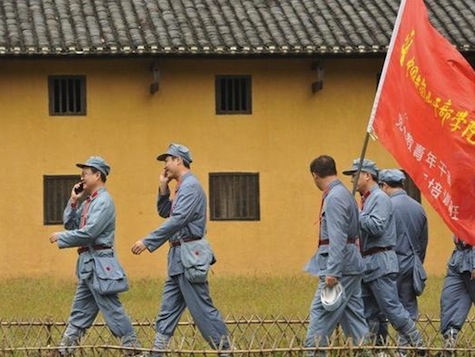JINGGANGSHAN (China) (AFP) – The Communist Party’s embrace of state-directed capitalism has utterly transformed China since Mao died in 1976. But heading into a once-a-decade power shift next week, it still plays a balancing act with its founding ideology.
At the Jinggangshan leadership academy, high-ranking officials of the party gather round on stools for lessons intended to deepen their understanding of the revolutionary communism espoused by Mao, who founded Red China in 1949.
Since 2005, trainees have been attending courses for days or weeks at the institute in the central Chinese town of Ciping, a hotspot for “red tourism” honouring Mao, the architect of collectivism and state control.
In the 1930s some of Mao’s revolutionary fighting force set off from the remote, mountainous area on the Long March that kept alive their struggle to take over China, and the teachings aim to inspire future leaders with their ideology.
Mao remains both venerated and feared — his successor Deng Xiaoping appraised his performance as “70 percent good, 30 percent bad”. His giant portrait continues to hang over Beijing’s Tiananmen Square, and his embalmed body rests in perpetuity in a mausoleum at the opposite end of the square.
Seared by that experience, and by the folk memory of Mao-era famines linked to disastrous economic policies, today’s leaders crave stability above all else.
Helping cadres keep the faith is seen as vital for the long-run future of the Communist Party. Despite having 82 million members and drawing popular support from decades of economic growth, the party has disenchanted many Chinese.
Widespread corruption and a year of scandal surrounding disgraced regional boss Bo Xilai leaves China’s new crop of leaders — who are set to be named at the party’s 18th congress starting Thursday — facing an identity crisis.
Bo, who will go on trial for corruption and other crimes, had led a Mao revival in the megacity of Chongqing with the singing of “red songs” and building of statues of the “Great Helmsman”, striking a chord with many Chinese.
Mao’s image resonates with some in part due to nostalgia for the extreme egalitarianism he imposed, especially as today’s “red capitalism” is associated by many with the pampered “princeling” offspring of high officials.
In September, the party demoted senior figure Ling Jihua after his son reportedly crashed a Ferrari in Beijing in a high-speed fatal accident that caused another embarrassing scandal.
The backlash against the perceived excesses and cronyism that have accompanied economic reform has given rise to a “conservative” left-wing including intellectuals and neo-Maoists.
So the party has to balance its espousal of market reforms with a purer strain of Maoist teaching taken from a simpler age, long before China became the world’s second-largest economy.
Heading the communism school in Jinggangshan is Li Yuanchao, the powerful chief of the party’s Organisation Department, which appoints key posts in the party and state-owned enterprises.
Under his leadership, there is official acknowledgement at the school that the country is thriving thanks to open markets and globalisation.
Along with tomes on the revolution, the library includes “many books” on the economy and modern finance as well as biographies of Western leaders such as Charles De Gaulle and Franklin D. Roosevelt, said Kuang Sheng, the school’s head of learning.
At the same time, he said: “To elevate party members’ level of theory, we have books on Marxist-Leninist thought.”

COMMENTS
Please let us know if you're having issues with commenting.